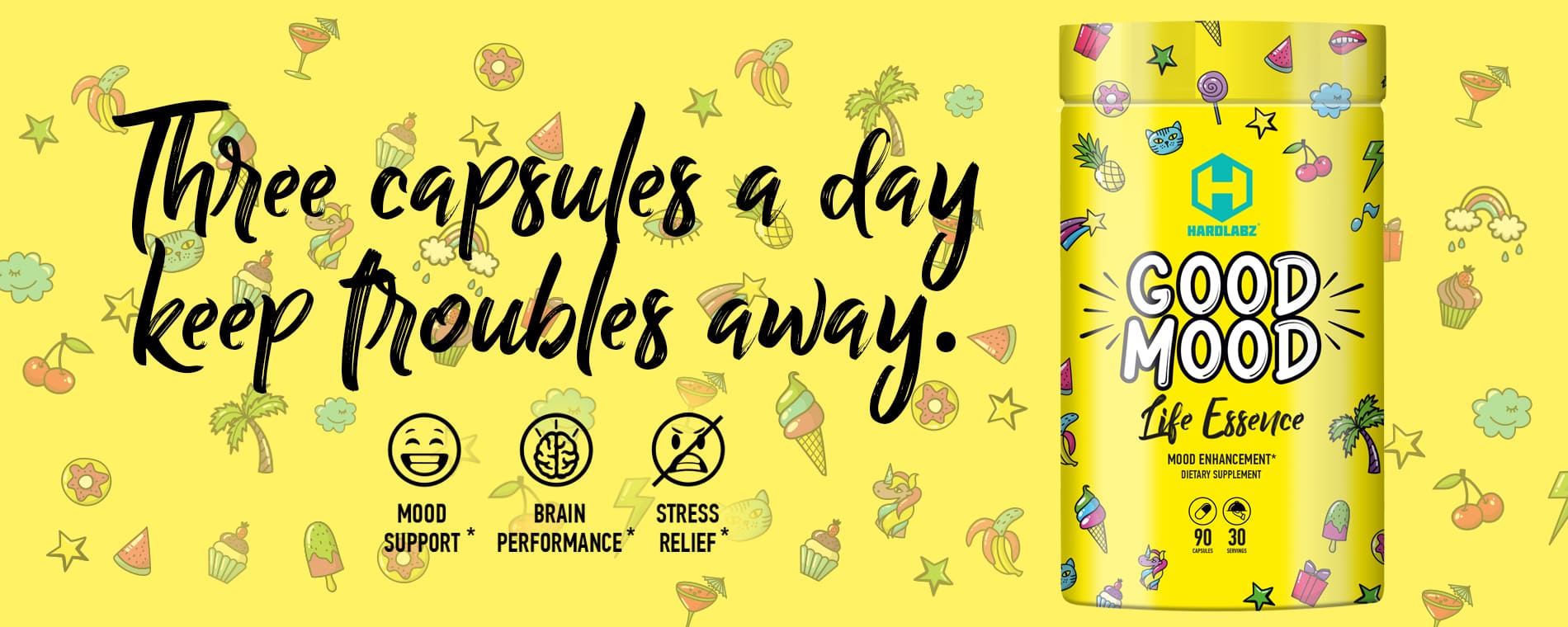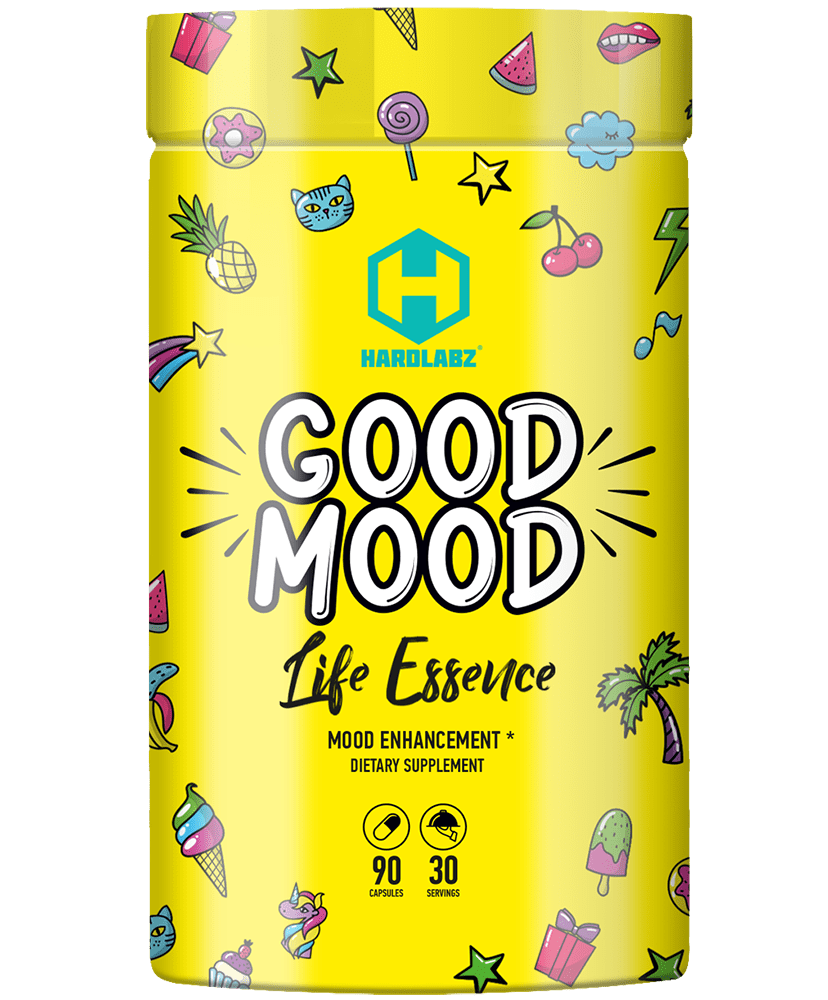Elevate Your Mind and Mood with HARDLABZ® GOOD MOOD - Your Ultimate All-Natural Nootropic Blend!
Unleash your cognitive potential and embrace a brighter mindset with GOOD MOOD – the essential tool for enhancing mental health, relieving stress, and optimizing brain performance.
- Empower Your Brain: Our nootropic formula, enriched with Lion’s Mane Mushroom and potent herbal extracts, is designed to nourish and enhance your brain's natural abilities, fostering clearer thinking and improved mental clarity.
- Stress Relief: Say goodbye to the weight of stress. GOOD MOOD is your dedicated ally in promoting relaxation and tranquility, allowing you to conquer challenges with a composed demeanor.
- Unlock Mental Performance: Elevate your mental prowess with GOOD MOOD's cutting-edge ingredients. Experience improved focus, memory, and creativity that propel you toward peak cognitive performance.
- All-Natural Advantage: Harness the power of nature without the compromise of artificial ingredients. GOOD MOOD is meticulously crafted with only the finest natural elements, ensuring your mental well-being is at its prime.
Embrace a life with heightened clarity and positivity – try HARDLABZ® GOOD MOOD now and experience the transformation of your mental journey. Elevate your mood, conquer stress, and redefine your cognitive horizons with the science of nature. *
* These statements have not been evaluated by the Food and Drug Administration. This product is not intended to diagnose, treat, cure or prevent any disease.

RECOMMENDED USE: Take 3 capsules in the morning with a meal.
Lion's Mane
Lion's Mane (Hericium erinaceus) is a unique and fascinating mushroom known for its distinctive appearance and potential health benefits.
Lion's Mane has gained popularity for its potential medicinal benefits, particularly in traditional Chinese and Japanese medicine. It contains bioactive compounds, including erinacines and hericenones, which may have neuroprotective and cognitive-enhancing properties. Some studies suggest it may support brain health, promote nerve regeneration, and potentially help with conditions like Alzheimer's disease and Parkinson's disease, although more research is needed in these areas.
Lion's Mane is also believed to have potential benefits for the immune system, digestive health, and overall well-being. It is sometimes used to reduce inflammation and support the gut microbiome.
Lemongrass
Lemongrass (Cymbopogon citratus) is a fragrant and flavorful herb widely used in culinary and medicinal applications.
Lemongrass has a history of use in traditional medicine for its potential health benefits. It is rich in essential oils, including citronellal and citral, which are believed to have antimicrobial, anti-inflammatory, and antioxidant properties.
Some potential health benefits of lemongrass include digestive support, pain relief, stress reduction, and fever reduction. It is also used in aromatherapy for its calming and soothing scent.
Gotu Kola
Gotu kola (Centella asiatica), also known as Centella or Asiatic pennywort, is a small herbaceous plant with a long history of use in traditional medicine and culinary practices in various parts of the world.
Gotu kola has a long history of use in traditional medicine systems, including Ayurveda and traditional Chinese medicine. It is known for its potential medicinal properties, and its active compounds, including triterpenoids and asiaticoside, are believed to have various health benefits.
Some potential uses include:
Cognitive Function: Gotu kola is often associated with enhancing cognitive function, memory, and mental clarity. It is sometimes referred to as a "brain tonic."
Wound Healing: The plant is thought to promote wound healing and skin regeneration. It may be used topically in creams or ointments for skin conditions and wound care.
Circulation and Vein Health: Gotu kola is believed to improve circulation and strengthen blood vessels. It is used to address conditions like varicose veins and venous insufficiency.
Anti-Inflammatory: It has anti-inflammatory properties and may help with conditions associated with inflammation, such as arthritis.
Stress and Anxiety: Some traditional uses suggest that Gotu kola may have calming and stress-reducing effects.
Ginger Root
Ginger root, scientifically known as Zingiber officinale, is a popular and aromatic spice that has been used for its culinary and medicinal properties for centuries.
Ginger has a long history of use in traditional medicine for its potential health benefits. It contains bioactive compounds, including gingerol, which are believed to have various medicinal properties.
Some potential uses include:
Digestive Aid: Ginger is known for its ability to alleviate nausea, motion sickness, and morning sickness during pregnancy. It can also aid in digestion and relieve indigestion and bloating.
Anti-Inflammatory: Ginger has anti-inflammatory properties that may help with conditions like osteoarthritis and muscle soreness.
Immune Support: It is believed to support the immune system and help the body fight off infections.
Pain Relief: Ginger may provide pain relief and reduce menstrual pain.
Anti-Nausea: It is often used to relieve nausea and vomiting associated with chemotherapy and surgery.
Rhodiola Rosea
Rhodiola rosea, commonly known as Rhodiola or Arctic root, is a perennial herb that grows in cold regions of Europe, Asia, and North America. This herb has been used for centuries in traditional medicine for its potential health benefits.
Rhodiola has a long history of use in traditional medicine in Russia, Scandinavia, and other northern regions.
It is known as an adaptogen, which means it is believed to help the body adapt to stress and maintain balance. In traditional medicine, Rhodiola has been used to enhance physical and mental stamina, reduce fatigue, and improve overall resilience.
Rhodiola rosea is considered an adaptogenic herb, and it is believed to offer several potential health benefits, including:
Stress Reduction: Rhodiola is thought to help the body cope with physical and emotional stress by regulating stress hormones like cortisol.
Energy and Fatigue: It is often used to combat fatigue, increase energy levels, and improve mental clarity and focus.
Mood Enhancement: Some people use Rhodiola to alleviate symptoms of depression and anxiety.
Cognitive Function: It may have cognitive-enhancing properties and support memory and concentration.
Immune Support: Rhodiola is believed to support the immune system and may have antioxidant properties.
Pine Bark
Pine bark, also known as pine bark extract or pine bark supplement, refers to the inner bark of various species of pine trees, primarily the maritime pine (Pinus pinaster). Pine bark extract is known for its potential health benefits and is often used in herbal and dietary supplements.
Pine bark extract is rich in bioactive compounds, including proanthocyanidins (also known as oligomeric proanthocyanidins or OPCs). These compounds are potent antioxidants that can help protect cells and tissues from oxidative stress and damage.
Pine bark extract is believed to offer a range of potential health benefits, including:
Antioxidant Protection: The proanthocyanidins in pine bark extract are powerful antioxidants that can help neutralize harmful free radicals, which are associated with various chronic diseases and aging.
Cardiovascular Health: Some studies suggest that pine bark extract may support heart health by improving blood flow, reducing blood pressure, and lowering LDL cholesterol levels.
Skin Health: Pine bark extract is used in some skincare products for its potential to promote collagen production, reduce the signs of aging, and improve skin elasticity.
Cognitive Function: There is ongoing research into the potential cognitive-enhancing effects of pine bark extract, particularly in relation to memory and attention.
Anti-Inflammatory: Pine bark extract may have anti-inflammatory properties and may be used to alleviate symptoms of inflammatory conditions.
Green Tea
Green tea is a type of tea made from the leaves of the Camellia sinensis plant that has undergone minimal oxidation during processing. It is known for its delicate flavor, mild caffeine content, and a wide range of potential health benefits.
Some of the potential benefits include:
Antioxidant Properties: Green tea is a potent source of antioxidants, which can help protect cells from oxidative damage.
Heart Health: It may help reduce the risk of heart disease by lowering LDL cholesterol levels and promoting healthy blood pressure.
Weight Management: Green tea is sometimes used as a component of weight management programs due to its potential to boost metabolism and fat oxidation.
Brain Health: Some studies suggest that the compounds in green tea may have neuroprotective effects and support cognitive function.
Cancer Prevention: While more research is needed, some studies have indicated that green tea may have a role in reducing the risk of certain types of cancer.
Caffeine Content:
Green tea contains caffeine, but the levels are generally lower than in black or oolong tea and significantly lower than in coffee. This makes it a popular choice for those seeking a mild caffeine boost without the jitters associated with stronger caffeinated beverages.
Ginkgo Biloba
Ginkgo biloba, commonly known as ginkgo or maidenhair tree, is one of the oldest tree species on Earth and has a rich history of traditional use in various cultures. It is known for its distinctive fan-shaped leaves and potential medicinal properties.
Ginkgo biloba has a long history of use in traditional Chinese medicine, where it has been employed to treat various ailments for centuries. In contemporary herbal medicine, Ginkgo biloba is primarily known for its potential health benefits, including:
Cognitive Function: Some studies suggest that Ginkgo biloba may improve memory, concentration, and cognitive function, particularly in older adults.
Circulation: It is believed to enhance blood flow, particularly in smaller blood vessels, which can be beneficial for conditions like peripheral artery disease.
Antioxidant Properties: Ginkgo biloba contains antioxidants that help protect cells from oxidative damage.
Age-Related Macular Degeneration (AMD): Some research has explored the use of Ginkgo biloba for managing AMD, an eye condition.
Tinnitus and Vertigo: It is used in some cases to alleviate symptoms of tinnitus (ringing in the ears) and vertigo.
Black Pepper (Bioperine)
Black pepper contains various bioactive compounds, with piperine being one of the most notable. Piperine is believed to have potential health benefits, including improved digestion, increased nutrient absorption (especially of certain vitamins and minerals), and potential anti-inflammatory properties.
Bioperine is a patented extract derived from black pepper. It contains a standardized amount of piperine, the active compound responsible for many of the potential health benefits associated with black pepper.
Bioperine is often used as a bioavailability enhancer. Its primary function is to improve the absorption of various nutrients, supplements, and drugs in the body. When taken alongside other substances, it can enhance their effectiveness by increasing their absorption in the digestive tract.





